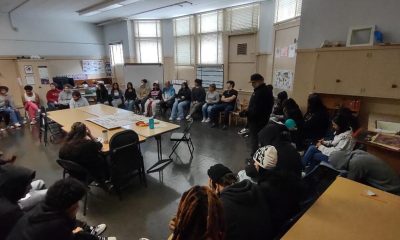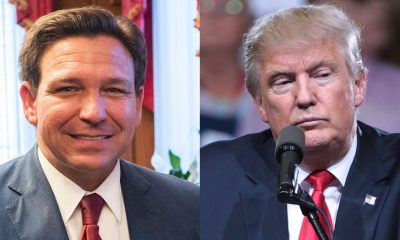National
US Loosens Embargo on Cuba, Making Trade and Travel Easier

In this March 22, 2013 file photo, miniature flags representing Cuba and the U.S. are displayed on the dash of an American classic car in Havana, Cuba. The Obama administration is putting a large dent in the U.S. embargo against Cuba as of Friday, significantly loosening restrictions on American trade and investment. (AP Photo/Franklin Reyes, File)
BRADLEY KLAPPER, Associated Press
MICHAEL WEISSENSTEIN, Associated Press
WASHINGTON (AP) — The Obama administration is putting a large dent in the U.S. embargo against Cuba as of Friday, significantly loosening restrictions on American trade and investment.
The new rules also open up the communist island to greater American travel and allow U.S. citizens to start bringing home small amounts of Cuban cigars after more than a half-century ban.
Thursday’s announcement of new Treasury and Commerce Department regulations are the next step in President Barack Obama’s plan to re-establish diplomatic relations with Cuba. They come three days after U.S. officials confirmed the release of 53 political prisoners Cuba had promised to free.
Only Congress can end the five-decade embargo. But the measures give permission for Americans to use credit cards in Cuba and U.S. companies to export telephone, computer and Internet technologies. Investments in some small business are permitted. General tourist travel is still prohibited, but Americans authorized to visit Cuba need no longer apply for special licenses.
Obama announced last month that he would soften the embargo and begin restoring diplomatic ties with Havana, saying “these 50 years have shown that isolation has not worked.” The deal was the product of 18 months of secret talks that culminated in the exchange of imprisoned spies and release of Alan Gross, a U.S. government contractor who had been imprisoned in Cuba for five years.
The few U.S. companies facilitating travel to Cuba say inquiries have exploded since December. American visits could triple this year, from about 90,000 annually. “We’re hiring more people, we’ve secured more hotel rooms and assets in Cuba to provide additional travel,” said Tom Popper, president of New York-based insightCuba.
With the new regulations public, the focus shifts to American businesses and the Cuban government. Some changes could take months as U.S. firms analyze the risks and benefits of moving into a complicated new market. And the Cuban government has said nothing publicly about how it will regulate new trade with the United States. Foreign companies currently deal almost entirely with state-owned firms that are notoriously slow, inefficient and short on cash.
Cuba will likely be more open to a surge in new travelers than to other potential effects of the loosened rules.
But Cuban hotels generally fall short of international standards and those with better food and service are almost always fully booked during the winter high season.
“This is good news, but we’re lacking infrastructure in hotels and in administration,” said Maikel Gonzalez, a 34-year-old hotel receptionist. “American tourists are really demanding. How do I explain to one that the taxi didn’t come because it doesn’t have tires or that there’s no water in the rooms?”
Individual Cubans can legally rent out their homes or apartments— a potential source of thousands of rooms for travelers and a flood of funding for private citizens that would be largely outside state control.
Also casting a shadow on potential deals is the possibility of litigation by Cuban-Americans and U.S. firms whose property was confiscated in Fidel Castro’s 1959 revolution and may try to sue companies entering into business with the Cuban government. In Washington, Congress may also seek to erect barriers to new investment.
The sudden rapprochement between Cold War foes has divided U.S. lawmakers. Republican Marco Rubio of Florida and Democrat Bob Menendez of New Jersey, both Cuban-Americans, have been particularly opposed.
But some pro-business types have welcomed the opportunity to open up a new export market in a country 90 miles from Florida. Thomas Donohue, the head of the U.S. Chamber of Commerce, for example, said Wednesday it was better for the U.S. to sell computers, smartphones and cars to Cuba than to cede such business to countries like Russia and China. Still, the embargo as a whole appears unlikely to fall anytime soon.
Starting Friday, U.S. companies will be able to export mobile phones, televisions, memory devices, recording devices, computers and software to a country with notoriously poor Internet and telecommunications infrastructure. Internet-based communications will fall under a general license. The new rules “immediately enable the American people to provide more resources to empower the Cuban population to become less dependent upon the state-driven economy,” White House spokesman Josh Earnest said Thursday.
With hundreds of thousands of Cuban-Americans visiting family each year, Cuba is already awash in American products brought in people’s luggage, including iPhones and flat-screen TVs. The main barriers to Internet access are high prices and restrictions imposed by a government desperate for hard currency and worried about allowing citizens unrestricted communications among themselves and with the outside world.
Americans permitted to travel to Cuba for family visits, official U.S. government business, journalism, research, education, religious activity and other reasons now fall under a U.S. general license and don’t need to apply for a separate license. A limit on remittance payments to family members in Cuba will be raised to $8,000 per year, from $2,000. Americans visiting Cuba will be allowed to bring home $100 in alcohol and tobacco products, and $400 in total goods.
The U.S. is now “one step closer to replacing out of date policies,” Treasury Secretary Jacob Lew said Thursday.
Other changes include:
—The elimination of limits on how much money Americans spend in Cuba each day or what they spend it on.
—Permissible use of U.S. credit and debit cards.
—Travel agents and airlines can fly to Cuba without a special license.
—Insurance companies can provide coverage for health, life and travel insurance policies for individuals residing in or visiting Cuba.
—Financial institutions may open accounts at Cuban banks to facilitate authorized transactions.
—Investments can be made in some small businesses and agricultural operations.
—Companies may ship building materials and equipment to private Cuban companies to renovate private buildings.
The U.S. and Cuba are scheduled to hold migration talks in Havana next week, the next step in their normalization process. Leading the American delegation is Roberta Jacobson, the top U.S. diplomat for Latin America. Her visit marks the highest-level trip to Cuba by a U.S. official since 1980.
Further down the road, Washington envisions reopening the U.S. Embassy in Havana and carrying out high-level exchanges and visits between the governments. Secretary of State John Kerry could travel to the island later this year.
___
Weissenstein reported from Havana. AP White House Correspondent Julie Pace contributed to this report.
Copyright 2015 The Associated Press. All rights reserved. This material may not be published, broadcast, rewritten or redistributed.
Alameda County
Seth Curry Makes Impressive Debut with the Golden State Warriors
Seth looked comfortable in his new uniform, seamlessly fitting into the Warriors’ offensive and defensive system. He finished the night with an impressive 14 points, becoming one of the team’s top scorers for the game. Seth’s points came in a variety of ways – floaters, spot-up three-pointers, mid-range jumpers, and a handful of aggressive drives that kept the Oklahoma City Thunder defense on its heels.

By Y’Anad Burrell
Tuesday night was anything but ordinary for fans in San Francisco as Seth Curry made his highly anticipated debut as a new member of the Golden State Warriors. Seth didn’t disappoint, delivering a performance that not only showcased his scoring ability but also demonstrated his added value to the team.
At 35, the 12-year NBA veteran on Monday signed a contract to play with the Warriors for the rest of the season.
Seth looked comfortable in his new uniform, seamlessly fitting into the Warriors’ offensive and defensive system. He finished the night with an impressive 14 points, becoming one of the team’s top scorers for the game. Seth’s points came in a variety of ways – floaters, spot-up three-pointers, mid-range jumpers, and a handful of aggressive drives that kept the Oklahoma City Thunder defense on its heels.
One of the most memorable moments of the evening came before Seth even scored his first points. As he checked into the game, the Chase Center erupted into applause, with fans rising to their feet to give the newest Warrior a standing ovation.
The crowd’s reaction was a testament not only to Seth’s reputation as a sharpshooter but also to the excitement he brings to the Warriors. It was clear that fans quickly embraced Seth as one of their own, eager to see what he could bring to the team’s championship aspirations.
Warriors’ superstar Steph Curry – Seth’s brother – did not play due to an injury. One could only imagine what it would be like if the Curry brothers were on the court together. Magic in the making.
Seth’s debut proved to be a turning point for the Warriors. Not only did he contribute on the scoreboard, but he also brought a sense of confidence and composure to the floor.
While their loss last night, OKC 124 – GSW 112, Seth’s impact was a game-changer and there’s more yet to come. Beyond statistics, it was clear that Seth’s presence elevated the team’s performance, giving the Warriors a new force as they look to make a deep playoff run.
#NNPA BlackPress
LIHEAP Funds Released After Weeks of Delay as States and the District Rush to Protect Households from the Cold
BLACKPRESSUSA NEWSWIRE — The federal government has released $3.6 billion in home heating assistance after a delay that left states preparing for the start of winter without the program’s annual funding.

By Stacy M. Brown
Black Press USA Senior National Correspondent
The federal government has released $3.6 billion in home heating assistance after a delay that left states preparing for the start of winter without the program’s annual funding. The Low-Income Home Energy Assistance Program, known as LIHEAP, helps eligible households pay heating and cooling bills. The release follows a shutdown that stretched 43 days and pushed agencies across the country to warn families of possible disruptions.
State officials in Minnesota, Kansas, New York, and Pennsylvania had already issued alerts that the delay could slow the processing of applications or force families to wait until December for help. In Pennsylvania, more than 300,000 households depend on the program each year. Minnesota officials noted that older adults, young children, and people with disabilities face the highest risk as temperatures fall.
The delay also raised concerns among advocates who track household debt tied to rising utility costs. National Energy Assistance Directors Association Executive Director Mark Wolfe said the funds were “essential and long overdue” and added that high arrearages and increased energy prices have strained families seeking help.
Some states faced additional pressure when other services were affected by the shutdown. According to data reviewed by national energy advocates, roughly 68 percent of LIHEAP households also receive nutrition assistance, and the freeze in multiple programs increased the financial burden on low-income residents. Wolfe said families were placed in “an even more precarious situation than usual” as the shutdown stretched into November.
In Maryland, lawmakers urged the Trump administration to release funds after the state recorded its first cold-related death of the season. The Maryland Department of Health reported that a man in his 30s was found outdoors in Frederick County when temperatures dropped. Last winter, the state documented 75 cold-related deaths, the highest number in five years. Rep Kweisi Mfume joined more than 100 House members calling for immediate federal action and said LIHEAP “is not a luxury” for the 100,000 Maryland households that rely on it. He added that seniors and veterans would be placed at risk if the program remained stalled.
Maryland Gov. Wes Moore used $10.1 million in state funds to keep benefits moving, but noted that states cannot routinely replace federal dollars. His administration said families that rely on medical equipment requiring electricity are particularly vulnerable.
The District of Columbia has already mapped out its FY26 LIHEAP structure in documents filed with the federal government. The District’s plan shows that heating assistance, cooling assistance, weatherization, and year-round crisis assistance operate from October 1 through September 30. The District allocates 50 percent of its LIHEAP funds to heating assistance, 10 percent to cooling, 13 percent to year-round crisis assistance, 15 percent to weatherization, and 10 percent to administrative costs. Two percent is used for services that help residents reduce energy needs, including education on reading utility bills and identifying energy waste.
The District’s plan lists a minimum LIHEAP benefit of $200 and a maximum of $1,800 for both heating and cooling assistance. Crisis benefits are provided separately and may reach up to $500 when needed to resolve an emergency. The plan states that a household is considered in crisis if it has been disconnected from energy service, if heating oil is at 5 percent or less of capacity, or if the household has at least $200 owed after the regular benefit is applied.
The District’s filing notes that LIHEAP staff conduct outreach through community meetings, senior housing sites, Advisory Neighborhood Commissions, social media, posters, and mass mailings. The plan confirms that LIHEAP applicants can apply in person, by mail, by email, or through a mobile-friendly online application and that physically disabled residents may request in-home visits.
As agencies nationwide begin distributing the newly released funds, states continue working through large volumes of applications. Wolfe said LIHEAP administrators “have been notified that the award letters have gone out and the states can begin to draw down the funds.”
#NNPA BlackPress
Seven Steps to Help Your Child Build Meaningful Connections
BLACKPRESSUSA NEWSWIRE — Swinging side by side with a friend on the playground. Sharing chalk over bright, colorful sidewalk drawings. Hiding behind a tree during a spirited game of hide-and-seek. These simple moments between children may seem small, but they matter more than we think

By Niyoka McCoy, Ed.D., Chief Learning Officer, Stride/K12
Swinging side by side with a friend on the playground. Sharing chalk over bright, colorful sidewalk drawings. Hiding behind a tree during a spirited game of hide-and-seek. These simple moments between children may seem small, but they matter more than we think: They lay the foundation for some of life’s most important skills.
Through everyday play, young children begin learning essential social and emotional skills like sharing, resolving conflicts, showing empathy, and managing their emotions. These social skills help shape emotional growth and set kids up for long-term success. Socialization in early childhood isn’t just a “nice-to-have”—it’s essential for development.
Yet today, many young children who haven’t yet started school aren’t getting enough consistent, meaningful interaction with peers. Research shows that there’s a decline in active free play and peer socialization when compared to previous generations.
There are many reasons for this. Children who are home with a parent during the day may spend most of their time with adults, limiting opportunities for peer play. Those in daycare or preschool may have restricted free play, and large classrooms can reduce supervision and social coaching. Some children live in rural areas, are homebound due to illness, have full schedules, or rely on screens to fill their playtime. And for some families, finding other families with young children to connect with isn’t easy.
While these challenges can feel significant, opportunities for connection still exist in every community. Families can take simple steps to help children build friendships, create a sense of belonging, and strengthen social skills. Here are some ideas to get started:
- Storytime sessions at libraries or local bookstores
- Community offerings such as parent-child workshops, art, music, gymnastics, swimming, or sports programs
- Weekly events at children’s museums, which may include art projects, music workshops, or science experiments
- Outdoor exploration, where kids can play with peers
- Local parenting groups that organize playdates and group activities
- Volunteer opportunities where children can participate, such as pet adoption events or packing meals at a food bank
- Classes for kids at local businesses, including hardware, grocery, or craft stores
Some of these community activities are free or low-cost and give kids the chance to build friendships and practice social skills. Parents can also model positive social behavior by interacting with other parents and encouraging their children to play with their peers.
These may seem like small moments of connection, but they can have a powerful impact. Every time your child shares a toy, plays make-believe with peers, or races a friend down the slide, they’re not just playing—they’re learning the skills that build confidence, empathy, and lasting friendships. And it’s good for you, too. Creating intentional opportunities for play also helps you strengthen your own network of parents who can support one another as your children grow together.
-

 Activism3 weeks ago
Activism3 weeks agoOakland Post: Week of November 12 – 18, 2025
-

 Activism3 weeks ago
Activism3 weeks agoIN MEMORIAM: William ‘Bill’ Patterson, 94
-

 Activism3 weeks ago
Activism3 weeks agoHow Charles R. Drew University Navigated More Than $20 Million in Fed Cuts – Still Prioritizing Students and Community Health
-

 Bay Area3 weeks ago
Bay Area3 weeks agoNo Justice in the Justice System
-

 #NNPA BlackPress3 weeks ago
#NNPA BlackPress3 weeks agoLewis Hamilton set to start LAST in Saturday Night’s Las Vegas Grand Prix
-

 #NNPA BlackPress3 weeks ago
#NNPA BlackPress3 weeks agoThe Perfumed Hand of Hypocrisy: Trump Hosted Former Terror Suspect While America Condemns a Muslim Mayor
-

 #NNPA BlackPress2 weeks ago
#NNPA BlackPress2 weeks agoBeyoncé and Jay-Z make rare public appearance with Lewis Hamilton at Las Vegas Grand Prix
-

 #NNPA BlackPress3 weeks ago
#NNPA BlackPress3 weeks agoTrump’s Death Threat Rhetoric Sends Nation into Crisis



























































